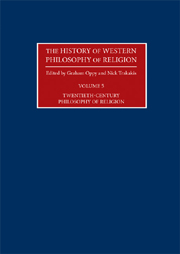Book contents
- Frontmatter
- Contents
- Editorial Introduction
- Contributors
- 1 Twentieth-Century Philosophy of Religion: An Introduction
- 2 William James
- 3 Henri Bergson
- 4 John Dewey
- 5 Alfred North Whitehead and Charles Hartshorne
- 6 Bertrand Russell
- 7 Max Scheler
- 8 Martin Buber
- 9 Jacques Maritain
- 10 Karl Jaspers
- 11 Paul Tillich
- 12 Karl Barth
- 13 Ludwig Wittgenstein
- 14 Martin Heidegger
- 15 Emmanuel Levinas
- 16 Simone Weil
- 17 A. J. Ayer
- 18 William P. Alston
- 19 John Hick
- 20 Mary Daly
- 21 Jacques Derrida
- 22 Alvin Plantinga
- 23 Richard Swinburne
- 24 Late-Twentieth-Century Atheism
- Chronology
- Bibliography
- Index
23 - Richard Swinburne
- Frontmatter
- Contents
- Editorial Introduction
- Contributors
- 1 Twentieth-Century Philosophy of Religion: An Introduction
- 2 William James
- 3 Henri Bergson
- 4 John Dewey
- 5 Alfred North Whitehead and Charles Hartshorne
- 6 Bertrand Russell
- 7 Max Scheler
- 8 Martin Buber
- 9 Jacques Maritain
- 10 Karl Jaspers
- 11 Paul Tillich
- 12 Karl Barth
- 13 Ludwig Wittgenstein
- 14 Martin Heidegger
- 15 Emmanuel Levinas
- 16 Simone Weil
- 17 A. J. Ayer
- 18 William P. Alston
- 19 John Hick
- 20 Mary Daly
- 21 Jacques Derrida
- 22 Alvin Plantinga
- 23 Richard Swinburne
- 24 Late-Twentieth-Century Atheism
- Chronology
- Bibliography
- Index
Summary
Richard Swinburne (b. 1934) retired from his position as Nolloth Professor of the Philosophy of the Christian Religion at the University of Oxford in 2002. He is perhaps the foremost philosopher of religion of the past hundred years. In addition, he has contributed to the philosophy of space and time, confirmation theory, general metaphysics and epistemology, and the philosophy of mind. His work in these areas has frequently been generated and applied in the course of his reasoning about God and religious faith. For example, the first half of The Christian God consists of general essays on substance, thisness, causation, time and necessity. Swinburne himself is a Christian.
BARE NATURAL THEOLOGY: THE CONTENT OF THEISM
Swinburne assumes that statements about God have substantial, controversial metaphysical implications: as found in the writings of such authors as Augustine, Aquinas, Descartes, Locke and Leibniz (see Vol. 1, Ch. 18; Vol. 2, Ch. 13; Vol. 3, Chs 8, 12, 13), as well as the speech of most non-philosophical believers, they are not to be interpreted as attempts at fiction or myth, or as consisting entirely in disguised expressions of one's values. This assumption is, obviously, consistent with recognizing that many statements about God are best interpreted as involving analogical predication or metaphor.
Natural theology consists in the discussion of God's existence and nature, conducted without appeal to the authority of revelation; it includes contributions by agnostics and atheists as well as by theists.
- Type
- Chapter
- Information
- The History of Western Philosophy of Religion , pp. 285 - 300Publisher: Acumen PublishingPrint publication year: 2009

